#dynastic conflict
Text
Thinking about Elizabeth Woodville as a gothic heroine is making me go insane. She entered the story by overturning existing social structures, provoking both ire and fascination. She married into a dynasty doomed to eat itself alive. She was repeatedly associated with the supernatural, both in terms of love and death. Her life was shaped entirely by uncanny repetitions - two marriages, two widowhoods, two depositions, two flights to sanctuary, two ultimate reclamations, all paralleling and ricocheting off each other. Her plight after 1483 exposed the true rot at the heart of the monarchy - the trappings of royalty pulled away to reveal nothing, a never-ending cycle of betrayal and war, the price of power being the (literal) blood of children. She lived past the end of her family name, she lived past the end of her myth. She ended her life in a deeply anomalous position, half-in and half-out of royal society. She was both a haunting tragedy and the ultimate survivor who was finally free.
#elizabeth woodville#nobody was doing it like her#I wanted to add more things (eg: propaganda casting her as a transgressive figure and a threat to established orders; the way we'll never#truly Know her as she's been constantly rewritten across history) but ofc neither are unique to her or any other historical woman#my post#wars of the roses#don't reblog these tags but - the thing about Elizabeth is that she kept winning and losing at the same time#She rose higher and fell harder (in 1483-85) than anyone else in the late 15th century#From 1461 she was never ever at lasting peace - her widowhood and the crisis of 1469-71 and the actual terrible nightmare of 1483-85 and#Simnel's rebellion against her family and the fact that her birth family kept dying with her#and then she herself died right around the time yet another Pretender was stirring and threatening her children. That's...A Lot.#Imho Elizabeth was THE adaptor of the Wars of the Roses - she repeatedly found herself in highly anomalous and#unprecedented situations and just had to survive and adjust every single time#But that's just...never talked about when it comes to her#There are so many aspects of her life that are potentially fascinating yet completely unexplored in scholarship or media:#Her official appointment in royal councils; her position as the first Englishwoman post the Norman Conquest to be crowned queen#and what that actually MEANT for her; an actual examination of the propaganda against her; how she both foreshadowed and set a precedent#for Henry VIII's english queens; etc#There hasn't even been a proper reassessment of her role in 1483-85 TILL DATE despite it being one of the most wildly contested#periods in medieval England#lol I guess that's what drew me to Elizabeth in the first place - there's a fundamental lack of interest or acknowledgement in what was#actually happening with her and how it may have affected her. There's SO MUCH we can talk about but historians have repeatedly#stuck to the basics - and even then not well#I guess I have more things to write about on this blog then ((assuming I ever ever find the energy)#also to be clear while the Yorkists did 'eat themselves alive' they also Won - the crisis of 1483-85 was an internal conflict within#the dynasty that was not related to the events that ended in 1471 (which resulted in Edward IV's victory)#Henry Tudor was a figurehead for Edwardian Yorkists who specifically raised him as a claimant and were the ones who supported him#specifically as the husband of Elizabeth of York (swearing him as king only after he publicly swore to marry her)#Richard's defeat at Bosworth had *nothing* to do with 'York VS Lancaster' - it was the victory of one Yorkist faction against another#But yes the traditional line of succession was broken by Richard's betrayal and the male dynastic line was ultimately extinguished.
59 notes
·
View notes
Text
I love and adore Alicent Hightower but baby, “My son has lost an eye…Over an insult? 🥺🥺”
sweetie you have been trying to leverage one of your culture’s greatest, most shameful taboos with anyone who will listen to get your ex crush/bff and her (v likely illegitimate tbf) sons disinherited for nearly ten years??
Now all of a sudden questioning someone’s legitimacy is nbd? Just ‘an insult’? Really? You’ve just been in a silly goofy mood for ten years? Bit of harmless name-calling was it?
Obviously a kids’ fight should never have escalated to someone losing an eye, because the children had no business being party to whatever political nonsense/family drama was going on. But the boys coming to blows over this was fairly predictable, especially as they got older. Babe, you actively chose to alienate your sons from their nephews in that way when you live in a culture where duels to the literal death over offended honour is a thing??? Where trial-by-combat is a 100% legit legal tactic?
Driftmark witnessed some truly audacious attempts at gaslighting that night but ALICENT REALLY
tl;dr Alicent lit the fuse on the Hightower v Velaryon/Strong kids conflict, she just didn’t intend for that particular bomb to go off so soon, or think that it would blow up in her son’s faces (much less that uh…literally)
#like is aemond losing an eye entirely alicent’s fault? no.#but as a queen and as a mother she played a large part in creating and enabling the negative environment that all those kids#grew up and learned how to interact with each other in#then goes all surprised pikachu when the result harms her own kids#goes along with the bigger trend of the greens starting conflicts without thinking through the implications#otto v daemon on dragonstone#alicent positioning her kids to go against rhaenyra’s#being the ones to press ‘go’ on a dynastic civil war that could (and did) wipe out their entire faction#aemond going after luke forever nuking his own reputation and damaging his family’s in the process#GUYS#THINK#alicent hightower#aemond targaryen#lucerys velaryon#rhaenyra targaryen#hotd#house of the dragon
113 notes
·
View notes
Text
hotd isn't without it's flaws but it's wild how much better and more coherent it is than got
#i think it actually massively benefits from the fact it's just a story of dynastic conflict#but with dragons#whereas got always had that stupid ass Great Evil plot hanging over its head#begging fantasy creators everywhere to realise that they do not need a dark vs light storyline to write fantasy#you really do not#fantasy can be anything#embrace this#also stop making the gods be real it fucking SUCKS ASS
2 notes
·
View notes
Text

i think this really exemplifies why the greens hold much more appeal to me (aside from reuniting most of the interesting characters) — the blacks seem to be here for badass cool moments with swelling music and as general audience pleasers. it’s dragons, straightforward cool guys, “epic moments” to clap at during the pub watch, etc. whereas the greens are underdogs who have to rely on plots and grounded means and who ultimately can’t win because the author just created them as a foil to his darlings <3
also i cannot believe someone would write “everyone thought they had it all sewn up … then a lady showed up riding a dragon reminding everyone of who they were messing with” but.. as like… praise? and not criticism? illustrating a main fundamental weakness of the show lol — that every semi clever & compelling plot is meaningless in the face of these flat action fantasy moments that pop up regularly to undo promising set ups.
#remember when it looked like they were setting up this cool dynastic conflict in house velaryon but#it was instantly resolved and forgotten when daemon murdered the brother of the lord of driftmark#in front of the entire court with no repercussions#for a… daemon badass moment (tm)? since the showrunners have a quota to fill or something (thank you eli for the term)#that was supremely not thought through. insultingly simplistic even.#but by god did the audience cheer#my posts#rhaenys didn’t even do anything clever— she was freed through no action of her own burst in with her dragon killing some plebs#scared everyone and then left and most of the youtube audience seems to consider the scene a highlight of the show#like cmon man#imagining this show without dragons and without daemon…… simpsons paradise thought bubble…..
4 notes
·
View notes
Text
Finished Pillars ahead of schedule. Perfect summer novel. Beachy. It’s a disconcerting read as a historical epic, a novel tackling highbrow matter, written in the style of an airport novel.
The fact of it being a generational saga about medieval civil strife doesn’t exclude it from being a fast-paced, uncomplicated tale of a heroic orphan getting the girl. The characters are designated good or evil, and even a ‘grey’ character like Tom isn’t allowed to actually exist as grey. Despite his sheer contempt for Agnes and role in the family strife, he’s portrayed as a good man who was trying his best even as Follett tells us about his daughter getting beaten on the regular under his watch. The men get what they want with a generous helping of sex scenes, while the author has a habit of giving little wiki summaries of scenes just in case we didn’t understand what was going on. The explanatory prose and re-hashing of events as they’re happening makes it feel a bit edutainment.
Then, especially at the end, it takes a turn into soap opera with hidden parentage reveals, conspiracies, courtroom drama. That’s not necessarily a bad thing. What Pillars is isn’t a grand statement. It’s a male-targeted bit of beach reading that gives you action scenes, raunch, and plot twists that just happens to be set in the Middle Ages. It’s the substance of an epic poured into the vessel of The Da Vinci Code. Follett is more talented than Brown, but he’s still one of the many thriller writers who have kept my mom occupied over the years. Pillars is against all expectations a junk food book. It doesn’t claim to be anything else, and it’s not written by anyone with higher aspirations. Recommend as a book to take camping
#kelsey liveblogs books#I can’t help but want to read it in the way I’d read Name of the Rose or Pentiment etc which it isn’t at all#actually. it’s got a lot in common with a chivalric romance#bodice rippery with some dynastic conflict in there
1 note
·
View note
Text
also i think “baby jaehaerys died for no fucking reason” might be the point. like yeah no one is a fair scorekeeper in this interpersonal conflict that escalated into a dynastic civil war with a death toll of thousands
416 notes
·
View notes
Text
a lot of targaryen takes sound like people making up some guys to get mad at. it gets a little tiring, the way they're imagined as uniquely awful within the text. i'm not certain we were meant to interpret them as the worst of westerosi nobility, simply that, being westeros' reigning house means they are afforded special narrative spotlight and scrutiny. if we had as much specific information on the history of the kings of winter or lords of winterfell, it would look much the same in terms of frequency of despotic rulers and dynastic conflicts. in the present timeline almost every noble house is in the process of unraveling, that's a theme with the lannisters, the tullys, the greyjoys, the baratheons, and the rest. the decline of house tully can be traced directly back to hoster forcing his teenage daughter through a dangerous abortion and then trading her as a political bargaining chip. it all goes back and back, tyrion thought, to our mothers and fathers and theirs before them. <- dynastic decline and intergenerational violence is an overarching series theme. like. "targaryens were always destined to die" is not really saying anything other than you think they're all ontologically evil i guess. and yeah about the dragons and the incest. well. i think the endogamy has more to do with concentrating dragon power within the family and less with the notion of 'valyrian supremacy'? i may regret saying this since i haven't read fire & blood cover to cover, but how is the sentiment behind “the blood of the dragon” materially different than “there must always be a stark in winterfell”? i don't know! they ALL believe in the inherent superiority of their bloodlines that's just how it works under feudalism where inheritance is secured through primogeniture.
#like sure. idk. i must not be annoyed by targ rot posts. being annoyed by targ rot posts is the mind killer or whatever paul said#agonised over posting this because i'm not trying to start discourse btw. don't start discourse#asoiaf#*[🫀]#house targaryen
195 notes
·
View notes
Text
"Fire and Blood is biased propaganda by the maesters so nothing in the real Dance of the Dragons actually happened like in the books, you can't critique the show for showing things as they really were!"
I'm so tired of this take...
GRRM wrote the original ASOIAF series as an anti-monarchy and anti-war story. He's an author who makes a point to flesh out characters and motivations, he understands that there isn't truly a good vs bad narrative to any large-scale, real-world conflict like war, and he understands the sociopolitical factors involved. His series highlights that it's the most vulnerable people in society who suffer when those in power play their game of thrones and make consequential decisions based on their own personal motivations without thought to the consequences to those that will have to the pay the price for them. That's GRRM's entire point with the original series: war destroys everything, it is never really justified, and through war the powerful set in motion terrible events that the most vulnerable are most like to suffer.
So the idea that all of a sudden with the prequel book Fire and Blood GRRM pivoted to write a biased textbook that purposefully misconstrues a conflict where the real story behind the pages is that one side of a dynastic civil war was led by a faultless, pure woman whose divine right to rule was stolen from her, and she's justified in plunging the realm into war to reclaim her throne because the other side was uniquely misogynist against her and was made up of selfish flawed people who just wanted to steal her power from her because she was a woman...
Sure, Fire and Blood may be a history book with unreliable narrators and sources that are trying to recount long-lost histories of the realm and possibly failing to capture the totality of what actually occurred. But I can absolutely guarantee you that the intended real history of the Dance of the Dragons as it took place in the world of ASOIAF was not some black and white, good vs bad tale of morality where one side was right and the other side was wrong like the show and some fans are insisting.
The actual Dance of Dragons as it exists in the ASOIAF timeline and universe, keeping in line with GRRM's original intention and message of the ASOIAF books, is 100% a story of a flawed, ultra-powerful family that fractured into two ideologically different factions that led to a pointless civil war in which neither side was justified in their attempts to seize power from the other. The result was that the family killed themselves until the only survivors were the traumatized children left over from either faction. In this pursuit of absolute power within one family thousands were subjected to the abject horrors of war: pillaging, famine, torture, sexual violence, being burned alive, and so much more. Neither side was faultless. Neither side had "the right" or justification to enact this conflict. Neither side bore sole responsibility for the conflict. Neither side was good or bad while the other was the opposite.
It really just fits outside of the world of ASOIAF to think that Fire and Blood's account of the Dance of the Dragons was uniquely biased against a single woman and her side of the conflict wherein this woman and her supporters were actually good people that had bad things done to them and all accounts in the book relating to them are inaccurate, yet most accounts of everyone else in the story were more or less true and accurate to how events played out. Like are you actually serious that this is how you think this story and history played out in this world of ASOIAF? That ultimately the story of the Dance of the Dragons is not anti-monarchy and anti-war in line with the original ASOIAF series but actually it's the story of a uniquely good woman in this terrible world who had a rightful claim to the throne and whose power was taken from her solely because of misogyny so she was justified in going to war to take it back? Like that's your analysis and interpretation on this conflict?
The way that the show is presenting this story is so unbelievably and ridiculously reductionist and simplified to the point where you begin to question why someone wanted to try to adapt the material at all... but then of course you remember that 1) Game of Thrones made a lot of money for a lot of people 2) its later seasons of mediocre, oversimplified writing continued to be rewarded with huge budgets, profits, and awards nominations despite the obvious downgrade of quality 3) so many modern writers believe the general audience needs to be spoonfed ideas and that they can't handle complexity, so it's more important that they shape an existing story into something that is a palatable, profitable hero vs villain tale that everyone can casually enjoy (and ideally appeals to modern sensibilities) than they try to create a compelling, thought-provoking, interesting and faithful adaptation of the source material.
#I am just. so tired#how many hoops do we have to jump through to justify bad writing?? like#and to those who say *fine enjoy the book canon the show canon is separate u can't criticize*#yes we can? we can mourn the good storytelling that's been thrown to the side?#asoiaf#fire and blood#hotd critical
218 notes
·
View notes
Text
The Most Underrated Line In All Of ATLA/TLOK And Its Many Worldbuilding Implications - A Ramble

In S2E7 of TLOK we get this dialogue from Wan and The Aye-Aye Spirit: "There are other Lion Turtles?" "Of course there are - dozens of them!" [timestamp 3:38 in this video]
It's such a quick line it's easy to miss, but there's one thing about it that made a LOT of things click into place for me about the Avatar universe's worldbuilding; the fact that there are (or were) dozens of Lion Turtles. NOT four, with one for each element, like you would assume. Dozens.
What does this mean in terms of the Four Nations? What connections might this have with other previously established lore? Well uhm follow me on this journey. I guess.
Pre-Unifications - A Global Warring States Era?
A warring states era on a wouldn't be nearly as compelling if there were only four Lion Turtles. If this were the case, everything would be perfectly balanced; why would there be disarray, violence, cultural disparity and struggles for power within each elemental group if the world was already perfectly divided into four solid groups? Why would a national identity be in question at all?
But the fact that there are more than one Lion Turtle per element... that means different groups of people being isolated from one another for long periods of time. This means different bodies of identity, regardless of element. Different city states, regional Kings, Queens, fiefdoms, dynastic power struggle, etc etc, before any sort of inherent loyalty the ones element as a national and cultural identity was established.
We know the Avatar world was not always divided into Four Nations. In Chapter 21 of The Rise Of Kyoshi we learn that Guru Laghima - a name you'll recognize from TLOK S3 - was from an era when the Four Nations had not yet been formed. We also know from Zaheer that he lived about 4,000 years before the events of TLOK (for context, thats about 6,000 years after Wan became the first Avatar).
There's further confirmation of this in Smoke And Shadow, where we learn about the first Firelord and the Fire Nation's unification wars.
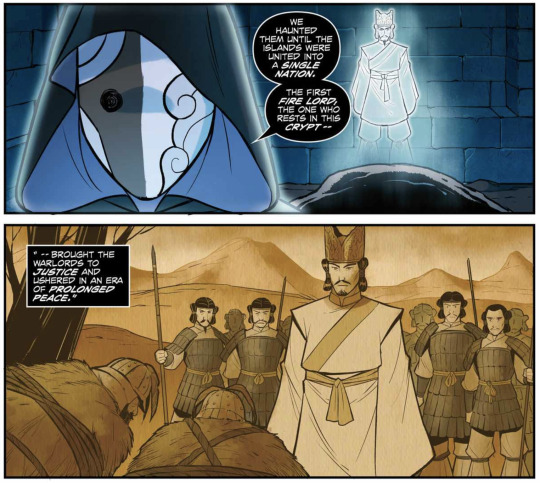
However there's implications of this even in the original series; it's not some sloppy ret-con from the books and comics, it fits. Think Omashu:
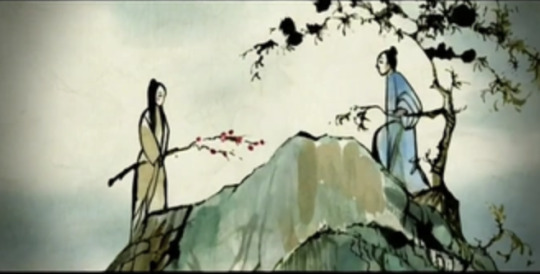
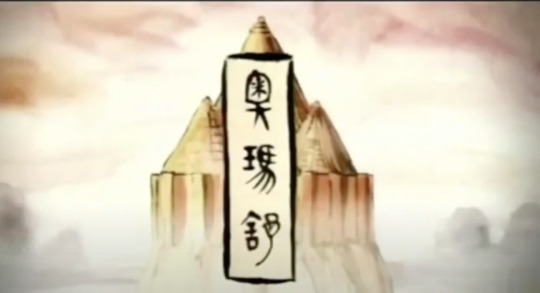
In S2E2 of ATLA we get the story of Oma and Shu - and we learn that they come from "warring villages." Now why exactly would their villages be warring if The Earth Kingdom already existed? Why the need for a power struggle? Why is it not presented as a civil insurrection or civil war, but as a conflict between two distinct groups of people? The answer is that the "Earth Kingdom" as we conceptualize it did not exist. I'd go further and say that we can assume that after Omashu was established it became a powerful regional kingdom, and created strong sphere of cultural influence. Think about it - Bumi is King Of Omashu. King. NOT the Earth King, King Of The Earth Kingdom, but still King Of Omashu.
[Now there's some debate about where Omashu's founding sits on the timeline but to me it HAS to be post-Wan, probably very nearly immediately post-Wan. The line that calls them the "first earthbenders" and that they "learned earthbending from the badger moles" has caused some to question if they fit in with the "Lion Turtles bestowed bending" lore, but to me it fits pretty easily. The Lion Turtles may have bestowed the power but the actual technique was learned from the badger moles and dragons and blah blah blah.]
I also find this line from Jianzhu in The Rise Of Kyoshi very illuminating:

VINDICATION !! And Jianzhu's moaning over the cultural diversity within his country brings me to the second part of this post...
FC Yee And Gene Luen Yang Accidentally (?) Make Avatar's Cultural Mish Mash Make More Sense
Avatar's cultural gumbo of visuals has always been a little hard to parse. If you follow @atlaculture then you know it'd be kind of fruitless to try and apply any one single ethnicity/culture to one nation. A common, and very valid, criticism of Avatar is the pan-asian approach it takes to worldbuilding. I'm not here to defend that lol. I think people who dislike Avatar on that basis are well within their rights to do so, and I also think it's important to enjoy things critically.
HOWEVER, from a worldbuilding perspective, the mish mash becomes easier to swallow when you think of it in terms of multiple groups of people being unified into different nation states over a very long period of time and slowly intertwining their cultures into a single(ish) identity.
Take the Fire Nation for example: in FC Yee's The Shadow Of Kyoshi we learn that the government was much more decentralized and the country was controlled by different clans, like the Saowon and Keosho, who had individual spheres of influence and strong senses of identity. It makes me think about Mai and Ty Lee
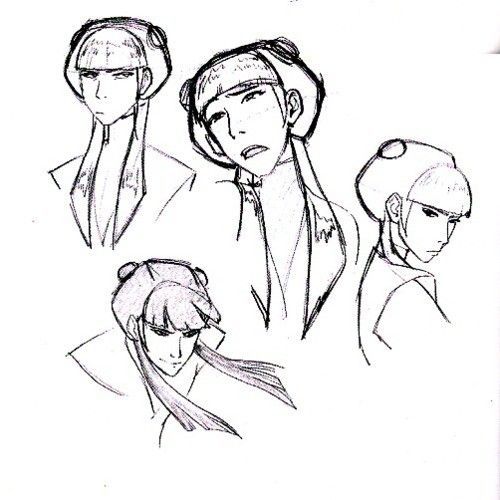
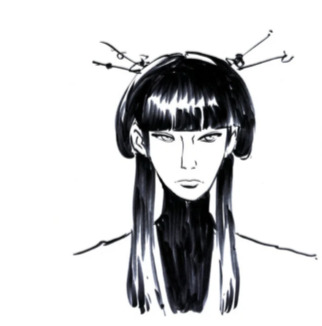
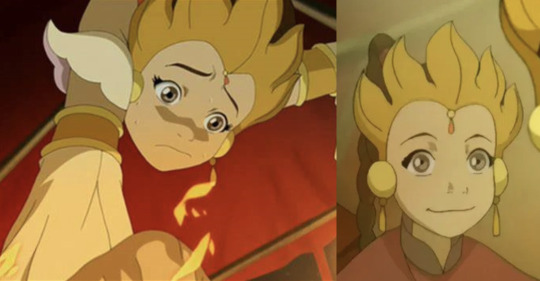
They're both Fire Nation nobles and they both live in the Fire Nation capital - but their styles/clothes are completely different. Now, obviously that can be boiled down to personality-based character design but. There's a wide discrepancy between Mai's Edo Japan inspired hair and Ty Lee's Thai inspired performance outfit, and a little retroactive canon about them being part of different but powerful clans .. ? Yeah. That'd be fun, at the very least.
I could go on about this... was there a Water Lion Turtle at the north AND the south? How did the airbenders transition from relatively sedentary life on a Lion Turtle to nomadism? etc etc etc BUT in conclusion: TLOK and the comics have some very fun worldbuilding implications snuck in there !! Which makes up for a lot in my opinion. Personally I'd KILL for an Avatar series set in the warring states/unification period... I think that could be insanely cool...idk. The End. For Now.
#atla#tlok#shadow of kyoshi#rise of kyoshi#this post may get even more added onto it after I read the Yangchen novels...#worldbuilding#like. I REALLY could go on and on but I'm tired and bound to make less and less sense to longer I type#FC Yee#gene luen yang
935 notes
·
View notes
Text
it's time for bed; m.k.
pairing: marc spector x reader, steven grant x reader, jake lockley x reader
summary: the boys help out when you have trouble falling asleep.
warnings: none, just fluff all the way through.
MOON KNIGHT MASTERLIST | ALL MASTERLISTS

steven
out of the three of them, steven’s the one who stays up the most. between late night inventory shifts at the museum and getting sucked into a new thousand-page tomb he picked up at a bookstore, he’s the one who tends to bid you goodnight with a sheepish smile, promising that he’ll join you in just a minute, love—I’m almost done.
of course he gets carried away—how couldn’t he? you can’t leave a book halfway through a chapter, after all. but the next chapter is only a dozen or so pages, he can get through that in a jiffy.
repeat that ad infinitum and then it’s late late, which makes him immediately embarrassed when you scuffle out of bed to where he’s seated on the couch.
“sorry, darling—lost track of time.” he slots a bookmark into his current page, giving you a warm smile as he stands. “I’ll come join you now—”
you shake your head, and steven frowns. “everything alright?”
“can’t sleep, s’all.” you mumble and he hums, pulling you down onto the couch with him. you lay your head in his lap, and he covers you with a throw blanket.
“you’re in for a treat tonight,” he says, voice soft as he picks up where he left off. “just started the part on conflicts during the first intermediate period of egypt.”
he starts reading again, out loud this time. steven keeps one hand in your hair, the other tracing over the words as he goes.
“Stable eras of Egyptian history are referred to as 'kingdoms' while eras of political strife or instability are known as 'intermediate periods.' this period has long been labeled a 'dark age'—oh, those are always fun, hm?” he raises his eyebrows and you can’t help but snort softly before he continues. “…When the central government of the old kingdom, which had been built on the model of the early dynastic period in Egypt…”
steven’s always had a nice voice but it’s gentler now, accent rolling over each syllable as he reads. his fingers lightly scratch your scalp and combined with the soothing sound of him speaking, you feel your eyelids grow heavy with each page he turns.
the first time you fell asleep while he read to you, it was on accident.
you just… couldn’t help it. there’s nothing more relaxing than listening to steven animate words on paper, injecting his comments here and there whenever he found something particularly interesting.
but even when you’d flushed red upon waking, steven wasn’t offended in the slightest.
why would he be? he glances down at you now and smiles. there’s a smidge of pride in his chest as you finally doze off in his lap.
he couldn’t care less about the book with you here, finding comfort in him.
steven doesn’t dare try to move you to the bed—not when you’ve finally fallen asleep—and only shifts his position to recline a bit further down the couch.
he can sleep like this. with you, steven could sleep anywhere.
jake
when jake stays up, it’s because he’s out late at night, working his cab shifts. he always lets you and the others know his schedule the minute it comes out so that there are no surprises between you all, and so you don’t worry when he doesn’t come home before you go to bed.
he makes sure to give you a little kiss and an I love you before he leaves, and even texts you around your bedtime as well: good night, princesa. sleep well.
you responded to him hours ago yet here you are, sinking into the mattress with not a wink of sleep to show for it.
it’s not a surprise when you end up hearing the turn of a key in the front door. then, the careful shuffling of someone trying to be quiet as jake comes back from work.
he clicks his tongue, thinking that you’ve left the light on when you fell asleep, but is quickly proven wrong when he sees you’re still awake.
“what are you doing up, baby?” he frowns at the clock, coming to kneel one knee beside you on the bed.
“can’t sleep.” you groan into a pillow, exhausted, and he sighs as brushes the hair back from your face.
“eat with me?”
jaek tends to have a quick bite after a shift before getting ready for bed—either leftovers from dinner or something quick he can scrounge up in the kitchen without making too much noise.
but you’re not asleep this time, eliminating the need to be quiet, and so he hums as he leads you to sit down at the dining table before he goes to search the fridge. he pulls out a container of pasta.
“who made this?”
“steven.”
it immediately gets tossed back on a shelf and you harumph on your poor boy’s behalf, though you know it’s just because jake hates vegan cheese.
the next thing he grabs is a saran-wrapped bundle, one which you recognize as the cookie dough marc made a few days back.
that makes you perk up. “you wanna bake some cookies?”
“who said anything about baking, princesa?”
so that’s how you end up curled around each other on the couch, picking at cookie dough with your hands as jake queues up a movie.
you raise an eyebrow at the runtime. “there’s no way I’m staying awake during all this, you know.”
“of course you are, this is one of my favourites.” he gives you a look, one that implies that you’ll break his heart if you don’t, and you splutter.
“you can’t—you can’t reverse-psychology me into falling asleep.”
“I’m not,” he claims, like a liar.
to his (faked) disappointment, you start to doze off about halfway through the movie, sugar still lingering on your tongue. for all the ribbing he might’ve done before, all he does is press a kiss to the top of your head from where it lays on his chest.
he’ll go to sleep when he’s ready. for now? jake’s got you in his arms and his alter’s baking to eat—it’s a good night.
marc
marc tries to go to bed when you do. no matter if they have to go out to patrol that night, he likes to lay with you as you fall asleep, feeling your breath slow in his arms as he embraces you against his chest.
it’s impossible to stay awake for long when marc’s holding you, not with the gentle way he plays with your hair and grazes his fingers over your skin.
but tonight is different. no matter how much you try, you just. can’t. fall asleep. you shift around in his arms, and he patiently allows you to rearrange your positions as you try to find something comfortable, but nothing sticks.
you grumble, frustrated, and he laughs softly. “can’t sleep?”
“no.” you press your face into his chest, as if you’d find the answer for sleep enveloped in the scent of him. you sigh. “you should just go on patrol, I’ll be fine.”
above you, marc stills, and tilts your head up to give you a stern look.
“none of that, now.” he lightly flicks your nose. “khonshu can wait.”
can he? you wonder, watching marc’s gaze flicker to an empty spot in the room for a moment. he doesn’t move however, only settling in even more beside you, almost pointedly.
you can’t help but grin. “are we antagonizing the bird tonight?”
“only a little.”
marc stays with you as long as you need, talking and joking around with you in bed. he might not say it, but these conversations are some of his favourites—just you and him in the dark, giggling softly as if you’ll wake the city up if you’re too loud.
he can stay up later than you, too, so he especially likes it when you finally start to drift off to sleep and your speech becomes nonsensical.
“don’t put that there,” you mumble out of the blue, eyes long since closed. you’ve practically melted in his arms, and he’s gentle with his touch as to not disturb you.
“my bad,” he whispers, fighting off a laugh. “where does it go?”
“’s simple… it’s…”
you let one last sigh and he knows that you’ve fallen asleep now, nuzzling into him like a cat.
marc wants nothing more than to curl up around you and go to sleep himself, but khonshu makes a snide remark and he knows that he’s pushed the god enough.
he does take one last moment to appreciate you though, admiring you in what little light streams in from the gaps in the curtains.
as much as he loathes to leave you each time, it’s a good motivator—the image of you in their bed, peaceful and safe. cleaning up the streets of crime is just one way for him to help keep you that way, and the faster he works, the sooner he can come home to you.
#moon knight x reader#marc spector x reader#steven grant x reader#jake lockley x reader#moon knight#marc spector#steven grant#jake lockley#moon knight fanfic#my writing
406 notes
·
View notes
Text
Premises for Kryn Operas, Part III
- “I Am Romanticizing Our Perpetual Border Conflicts With Lots of Noble Horns and A Tenor With Washboard Abs”
- Actually, The Sound Engineering For This One Involves A Totally New Spell Because Everyone Is Wearing Insectoid Helmets The Whole Time
- This Is Just Hamlet
- “Beloved, Leave Me Behind And Seek the Surface, I Will Be With You In The Breeze That Caresses Your Cheek” [adaptation of a pre-Luxon fable]
- “The Matriarchy Is Still A Problem, And I Can’t Believe I Have To Write Another Goddamn Opera About It In Every Life So Far”
- Four Confusing Hours of Dancing Invertebrates [What If The Local Wildlife Were Twee?]
- Blatantly Racist Holdover Classic That Makes Everyone Uncomfortable, And There Are Academic And Critical Brawls Every Time It’s Performed [It’s About Orcs]
- “My Ph.D. Thesis About Themes of Lust In Early Dynastic Literature, Because Putting It To Music Was Less Scary Than The Defense Panel”
- The Scripts Were Collected And Censored, So It’s Anyone’s Guess
- “Wow, The Aurora Watch Sure Are Cool”
- Horrid, Accursed Musical Instrument As A Metaphor For The Seductive Lies Of The Spider Cult
- Edgy Import/Translation/Adaptation Of An Empire Piece
144 notes
·
View notes
Text
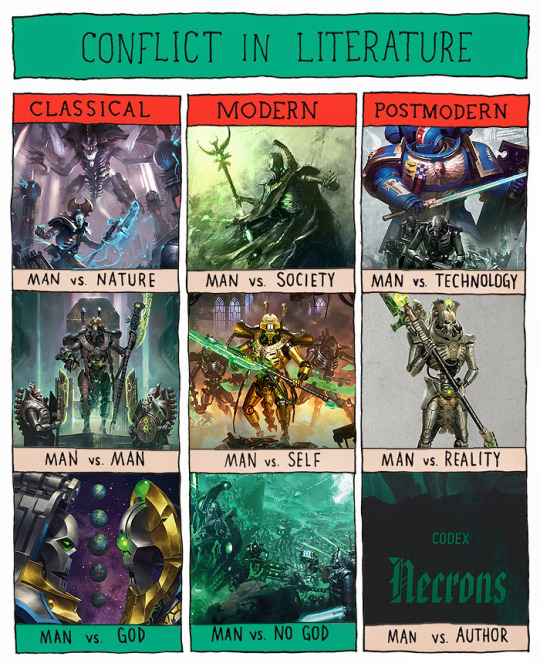
Conflict in Literature + Necron Books
(Read more for titles and notes, watch out for spoilers)
Man vs. Nature - Devourer
This is not the only necron vs. tyranid lit, but I thought the cover illustrated the conflict best. Out of all the horribad things in WH40K, the tyranids tend to be presented as the closest faction to a natural disaster; certainly in Devourer they do not logically justify their presence, nor can they be reasoned with, not by the Blood Angels or Anrakyr or the Tomb World he's trying to wake. Not mindless, but an amoral happenstance, like nature itself.
Man vs. Society - The Lords of Borsis
Necron court intrigue played straight, with a sprinkle of delusion on the side. Since this story revolves entirely around the schemings and plottings of necron(tyr) society, with changes in dynastic hierarchy as the final objective, it fits best here.
Man vs. Technology - Indomitus
This is an awkward placement, since Indomitus was not, well... a compelling story, with most of its tropes not being explored beyond their first introduction. But it is the most bare-bones way of describing this book's premise. Humans battling a robotic malignancy, albeit with a Bolivian Army Ending, which doesn't conclude the plot in either direction 😞
Man vs. Man - The Twice-Dead King: Ruin
Ruin is an exceptionally deep novel, and fits every conflict listed here. It was the hardest one to place, because it's not so much choosing the one that goes best, rather crossing off every other conflict not central to the story. Both gods and the absence-of-gods are a problem in Ruin, as well as nature and technology, but they're not at the heart of Oltyx's problem. Society could be a big one, since Oltyx is an exile - but he’s not trying to antagonize his society throughout Ruin, he's trying to work with it, or at least save it from doom. Self and reality both count, but fit better with other stories in the Nate Crowley corpus. So man vs. man it is. His most important clashes are all with individuals ('man') - Djoseras, Unnas, Hemiun, arguably Yenekh in reserve - and by the end, his crownworld is overrun by the Imperium, who will become the antagonists for the second part of his tale. Man vs. 'Man', with a capital M.
Man vs. Self - The Twice-Dead King: Reign
Again, this could have gone elsewhere. In man vs. reality, perhaps, or the god-related ones. But the self is where the conflict of Reign truly lies, since Oltyx's greatest obstacle is himself, and it is his inability to accept that which brings his dynasty close to destruction. Thank goodness he got over that one.
Man vs. Reality - Severed
The emotional and philosophical core of this novella relies on it. Zahndrekh's inability to see the world as it is brings about the whole plot, and is at the centre of all of Obyron's musings. Interestingly, reality does not win at the end, at least not what necrons envision reality to be: a place of cold hard facts, with no room for emotion. Zahndrekh would rather dream the impossible dream, which might be the healthier way to deal with their situation.
Man vs. God - The Infinite and the Divine
🚨 𝔻𝕆 ℕ𝕆𝕋 𝔹𝔼 𝔻𝔼ℂ𝔼𝕀𝕍𝔼𝔻 🚨
Man vs. No God - Crusade: Pariah Nexus
Not a novel, not 100% about necrons, not even out yet as of now (Dec 2023). This is an inherently problematic conflict for WH40K, because gods are very real and very present in that universe... here I'm only thinking about the necron perspective, and the civil war unfolding in their lore. They banded together in a shared purpose eons ago, destroying the Old Ones who oppressed them, and sundering the star gods who subjected them to biotransference. Now they are as antigod as they could be, and they did not retain their bonds, they have once again turned on each other. So it goes.
Man vs. Author - Codex: Necrons (10th Ed.) (Collector's Ed.)
James Workshop knows what they did. 😑
#warhammer 40k#wh40k#trazyn the infinite#orikan the diviner#the infinite and the divine#essay#oltyx#the twice dead king#anrakyr the traveller#devourer#the lords of borsis#indomitus#nemesor zahndrekh#vargard obyron#severed#pariah nexus#codex: necrons#necron#necrons#conflict in literature
301 notes
·
View notes
Text
PSA - Don't Treat JTTW As Modern Fiction
This is a public service announcement reminding JTTW fans to not treat the work as modern fiction. The novel was not the product of a singular author; instead, it's the culmination of a centuries-old story cycle informed by history, folklore, and religious mythology. It's important to remember this when discussing events from the standard 1592 narrative.
Case in point is the battle between Sun Wukong and Erlang. A friend of a friend claims with all their heart that the Monkey King would win in a one-on-one battle. They cite the fact that Erlang requires help from other Buddho-Daoist deities to finish the job. But this ignores the religious history underlying the conflict. I explained the following to my acquaintance:
I hate to break it to you [name of person], but Erlang would win a million times out of a million. This is tied to religious mythology. Erlang was originally a hunting deity in Sichuan during the Han (202 BCE-220 CE), but after receiving royal patronage during the Later Shu (934-965) and Song (960-1279), his cult grew to absorb the mythos of other divine heroes. This included the story of Yang Youji, an ape-sniping archer, leading to Erlang's association with quelling primate demons. See here for a broader discussion.
This is exemplified by a 13th-century album leaf painting. The deity (right) oversees spirit-soldiers binding and threatening an ape demon (left).
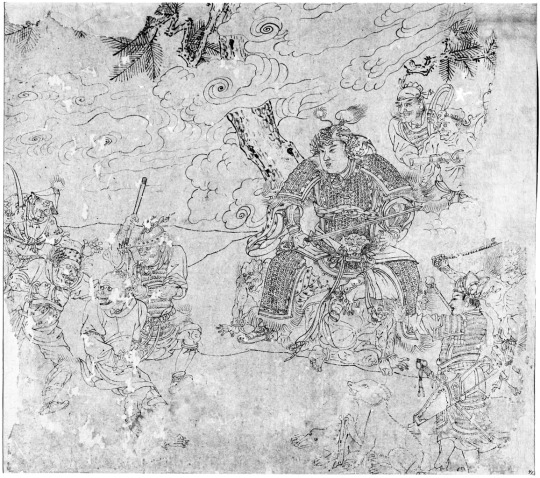
Erlang was connected to the JTTW story cycle at some point, leading to a late-Yuan or early-Ming zaju play called The God Erlang Captures the Great Sage Equaling Heaven (二郎神鎖齊天大聖). In addition, The Precious Scroll of Erlang (二郎寳卷, 1562), a holy text that predates the 1592 JTTW by decades, states that the deity defeats Monkey and tosses him under Tai Mountain.
So it doesn't matter how equal their battle starts off in JTTW, or that other deities join the fray, Erlang ultimately wins because that is what history and religion expects him to do.
And as I previously mentioned, Erlang has royal patronage. This means he was considered an established god in dynastic China. Sun Wukong, on the other hand, never received this badge of legitimacy. This was no doubt because he's famous for rebelling against the Jade Emperor, the highest authority. No human monarch in their right mind would publicly support that. Therefore, you can look at the Erlang-Sun Wukong confrontation as an established deity submitting a demon.
I'm sad to say that my acquaintance immediately ignored everything I said and continued debating the subject based on the standard narrative. That's when I left the conversation. It's clear that they don't respect the novel; it's nothing more than fodder for battleboarding.
I understand their mindset, though. I love Sun Wukong more than just about anyone. I too once believed that he was the toughest, the strongest, and the fastest. But learning more about the novel and its multifaceted influences has opened my eyes. I now have a deeper appreciation for Monkey and his character arc. Sure, he's a badass, but he's not an omnipotent deity in the story. There is a reason that the Buddha so easily defeats him.
In closing, please remember that JTTW did not develop in a vacuum. It may be widely viewed around the world as "fiction," but it's more of a cultural encyclopedia of history, folklore, and religious mythology. Realizing this and learning more about it ultimately helps explain why certain things happen in the tale.
#sun wukong#monkey king#journey to the west#jttw#Erlang#Erlang shen#Buddhism#Taoism#Chinese mythology#Chinese religion
359 notes
·
View notes
Photo

A map illustrating the course of a series of civil wars in the Kingdom of England between the houses of Lancaster and York for the crown. Known today as the Wars of the Roses (a term coined in the 19th century by Sir Walter Scott), this dynastic conflict (1455 – 1487) arose from a variety of political, social, and familial factors, with two rival branches of the Plantagenet dynasty vying for supremacy...
41 notes
·
View notes
Note
Please tell me more about neighbourhood PMCs in renaissance Italy
It would be my pleasure! (My research into this owes a lot to the excellent Power and Imagination: City-States in Renaissance Italy by Lauro Martines.)
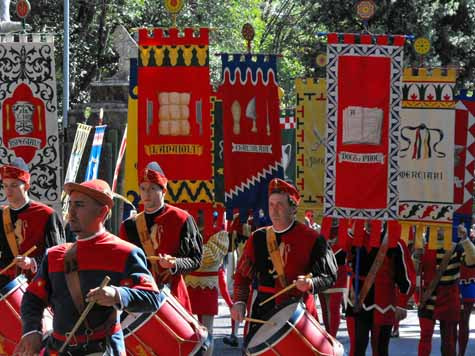
The first thing to note that, unlike the condottieri, these were not private military companies. Rather, the neighborhood military companies (in the sense of a military unit, rather than a profit-making entity) were self-defense organizations formed as part of a centuries-long political struggle for control over the urban commune between the signorile (the urban chivalry)/nobilita (the urban nobility) and the populo (the guilded middle class, who claimed to speak on behalf of "the people").
This conflict followed much the same logic that had given rise to the medieval commune in the first place. Legally, the communes had started as mutual defense pacts between the signorile and the cives (the free citizens of the city) against the rural feudal nobility, which had given these groups the military and political muscle to push out the marquises and viscounts and barons and claim exclusive authority over the tax system, the judicial system, and the military.
So it made sense that, once they had vanquished their enemies and established the commune as the sovereign, both sides would use the same tactic in their struggle over which of them would rule the commune that ruled the city. The signorile and nobilita formed themselves into consorteria or "tower societies," by which ancient families allied with one another (complete with dynastic marriage alliances!) to build and garrison the towers with the knights, squires, men-at-arms, and bravi of their households. These phallic castle substitutes were incredibly formidable within the context of urban warfare, as relatively small numbers of men with crossbows could rain down hell on besiegers from the upper windows and bridges between towers, even as the poor bastards on the ground tried to force the heavy doors down below.
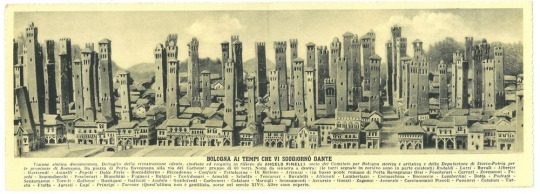
To combat noble domination of communal government, achieve direct representation on the political councils, establish equity of taxation and regulate interest rates, and enforce legal equality between nobility and citizenry, the populo formed themselves into guilds to build alliances between merchants and artisans in the same industries. However, these amateur soldiers struggled to fight on even footing with fully-trained and well-equipped professional soldiers, and the guild militias were frequently defeated.
To solve their military dilemma, the populo engaged in political coalition-building with the oldest units of the urban commune: the neighborhoods. When the cities of medieval Italy were originally founded, they had been rather decentralized transplantations of the rural villages, where before people had any conception of a city-wide collective their primary allegiance was to their neighborhood. As can still be seen in the Palio di Siena to this day, these contrade built a strong identity based on local street gangs, the parish church, their traditional heraldry, and their traditional rivalries with the stronzi in the next contrade over. And whether they were maggiori, minori, or unguilded laborers, everyone in the city was a member of their contrade.
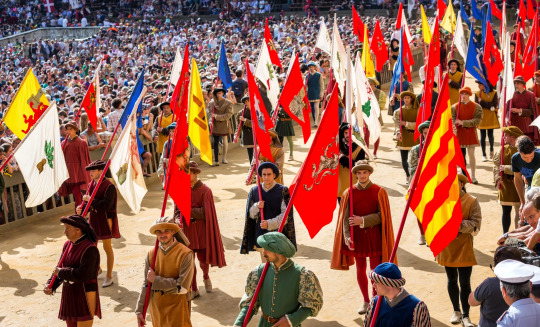
As Martines describes, the populo both recruited from (and borrowed the traditions of) the contrade to form their armed neighborhood companies into a force that would have the manpower, the discipline, and the morale to take on the consorteria:
"Every company had its distinctive banner and every house in the city was administratively under the sign of a company. A dragon, a whip, a serpent, a bull, a bounding horse, a lion, a ladder: these, in different colors and on contrasting fields, were some of the leitmotifs of the twenty different banners. They were emblazoned on individual shields and helmets. Rigorous regulations required guildsmen to keep their arms near at hand, above all in troubled times. The call to arms for the twenty companies was the ringing of a special bell, posted near the main public square. A standard-bearer, flanked by four lieutenants, was in command of each company."
To knit these companies organized by neighborhood into a single cohesive force, the lawyers' guilds within the populo created a state within a state, complete with written constitutions, guild charters, legal codes, legislative and executive councils. Under these constitutions, the populo's councils would elect a capitano del popolo, a professional soldier from outside the city who would serve as a politically-neutral commander, with a direct chain of command over the gonfaloniere and lieutenants of the neighborhood companies, to lead the populo against their noble would-be overlords.
And in commune after commune, the neighborhood companies made war against the consorteria, taking the towers one by one and turning them into fortresses of the populo. The victorious guilds turned their newly-won military might into political hegemony over the commune, stripping the nobilita of their power and privilege and forcing them either into submission or exile. Then they directed their veteran neighborhood companies outward to seize control of the rural hinterland from the feudal aristocracy, until the city had become city-state.
(Ironically, in the process, the populo gave birth to the condottieri, as the nobility who had lost their landed wealth and political power took their one remaining asset - their military training and equipment - and became professional mercenaries. But that's a story for another time...)
#history#historical analysis#renaissance history#renaissance fantasy#medieval cities#city-states#urban communes#guilds#city charters#guild charters#mercenaries#nobility#artisans#burgher rights#merchants
146 notes
·
View notes
Note
hey why do people write jon’s name as all one word. hi i’m jonsnow. yk
Well Jon is a night and the exiled former Lord of Griffin’s Roost introduced in a dance with dragons who is currently leading his very doomed sweet lamb of an adopted son to his death on the sacrificial altar of dynastic ambition which can never bring back what is already lost to reconquer Westeros with the golden company even though he’s slowly dying of grayscale. I love Jon he is a really interesting character and every single one of his chapters is just filled with this internal conflict that’s just like. abandoned temple ozymandias sense of lost glory and extreme melancholy and desiccation into ruin while everything is still so deeply intimate and small and interpersonal to him. It’s so good. oh and then there’s jonsnow he got elected class president hes in a dance with dragons too. good for him
#in twow when every single jonsnow chapter is epithet titled and then the joncon chapters are just jon you will understand. you will all see#asoiaf
55 notes
·
View notes